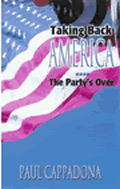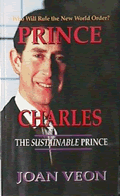Related
Articles:
Global Taxes Looming, Watch Your Wallet
Other
Veon
Articles:
US Leaders Highlight World Economic Forum Agenda
Global Taxation And Tax Harmonization
Does The
Global Economy Need a Global Currency?
WILL THE U.N. DIP INTO YOUR FUTURE SALARY?
By
Joan Veon
January 30, 2006
NewsWithViews.com
Complexity is the top concern here at Davos. Complexity as it pertains to technology, geo-politics, cultures, the demand of business to produce a product cheaper and better, off-shoring, globalization and the rise of China and India. What better place to discuss the state of the world than at The World Economic Forum. Every year, key power movers and shakers are brought together to discuss and to hob-knob. After all, the name of the game is business--or is it?
There is no doubt about the power that the World Economic Forum wields and there is no surprise as to the people who vie for an invitation to come to Davos. It is not unreasonable to see a sheik, crown prince, duchess, duke, king, or queen. Yesterday everyone was staring at the very pregnant Angela Jolie and her lover, Brad Pitt.
However, we need to look further at the structure that is being put in place. Do the CEOs who come here really understand what they are participating in? While they run major businesses that impact the daily lives of thousands of people and create markets around the world, the question is, "Do they understand?"
At my first meeting in 1998, I saw that the structure was like that of a major UN mega-conference with meetings and workshops talking about the UN agenda, also known as global governance. It was Kofi Annan's first appearance here as Secretary-General. I don't know who was more awed-Kofi Annan with the capital kings and queens of global business--or they by him.
However, it is not business networking that is the primary function of the World Economic Forum since it has NGO status with UNESCO. Perhaps we could say the WEF was put in place to facilitate the future merger between government, business, and civil society. These three are the new actors in global governance and they came "on stage" together in 1998.
That year, Kofi Annan was accompanied by his advisor, Maurice Strong, who coached him in what he was to say and do. At that meeting, I posed a question to Mr. Strong, who informed me that the Secretary-General would answer it. Kofi Annan told me that the UN would be holding a Millennium Summit in 2000, where they would like to set up a "People's Chamber" that would represent the people of the world who would, in time, elect their own UN representative. The second chamber would be equal to our House of Representatives. He also announced the formation of the UN Global Compact which would solicit businesses to work with the UN to help them meet their goals. This had not happened before-the merger of government and business-except during World War II when Mussolini was financed by American bankers. Do CEOs understand this-were their history teachers negligent-or, even worse, do they pretend not to understand?
In all the research and interviews that I have done on the Global Compact, Kofi Annan has been given the credit for it. However, when Prince Charles toured the U.S. last November, he said in a speech that he met with the Secretary-General in New York to discuss the possibility of business and government working together and that the Global Compact was his initiative. We really have to wonder who Prince Charles is in that he appears to walk to and fro over the earth with great power to command.
In his last Davos speech as secretary-general, Kofi Annan called for the radical reform of the United Nations. What he meant by this is that the objective of UN powers should be expanded to include individuals and not just countries. In order to understand the magnitude of this, the UN unveiled the Millennium Development Goals in 2000, which calls for poverty, hunger, disease to be reduced by 50% by 2015 and for every child to be given a primary education. To meet these goals, the UN has been working with national governments as well as all other actors: business, non-governmental organizations, labor unions, etc. Here in Davos, the topic of businesses helping the UN to mobilize monies is a recurring issue. The fact that the UN now wants to have power over the PEOPLE of the world, is a major seizure of power. If they have power over all the people, then that means UN Resolutions supersede national laws. Then we have to ask, "What does that mean with regard to the jurisdiction of the International Criminal Court?" Do CEOs really understand this?
The Prince of Wales International Business Leaders Forum formed in 1990 and its objective is to form public-private partnerships with businesses, governments, and non-governmental organizations. The idea whereby businesses and governments form a partnership to manage a water or electric facility, waste water or transportation system, is basically fascism. Fascism is where government and business "co-manage" what formerly was a government responsibility. In 1990, Prince Charles started to open the way for public-private partnerships to come together globally. Since then their popularity has become the change agent for changing the structure of traditional government as we have known it. In this regard, the prince helped to pioneer the concept of "corporate social responsibility" which is where corporations take responsibility to solve social issues. In the past, only the socialists did this. So perhaps we could say corporations are being "socialized." Do CEOs really understand this?
In a workshop on humanitarian relief and the involvement of businesses, Michael S. Klein, CEO of Citibank's Global Banking told me that they contribute to UN humanitarian causes out of excess capacity, just-in-time delivery, and continuity of business. They have over $2T at their disposal. While this makes sense to me, the chancing philosophy of what it represents is of concern. DHL, which provides instant movement of emergency goods during the first three critical days of a disaster, in response to my question about spending corporate profits for social issues instead of doing what business is supposed to do, said that it helps the company's image and helps the employees feel good about what they can do and that their company is "part of the process." While I certainly understand the desire for each of us to help mankind, do these companies know that they are changing the landscape of how society and government used to operate? I doubt it. Not too long ago there were specific divisions between what business and what government did. Now they are conjoined, do the CEO's understand that they are helping to de-construct government as we have known it and that they're normalizing this new structure?
The UN, as well as the World Economic Forum and the Prince of Wales Business Leaders Forum, have been setting up humanitarian organizations to deal with disasters for a number of years. As a result of last year's South Asia tsunami and Hurricanes Katrina and Rita in America, the people of the world have come on board with humanitarian relief. In other words, the world has been integrated as one--through the heart and soul--where our emotions are housed. More aid poured out to people displaced by the tsunami than ever before in the history of the UN and the world. Globally, churches, schools, corporations, social clubs, movie stars, governments, foundations, and children raised monies for disaster relief. The soul of the world became one. This could not have happened unless the heart strings were affected.
Now the UN, their Global Compact, and humanitarian agencies and non-governmental organizations, are looking to set up a completely integrated system whereby corporate excesses can be mobilized at will and upon one phone call, corporations anywhere in the world can allocate employees, money, time, and profits for the sake of helping during a disaster. This is historic! Let it be understood that when there was a time when corporate excesses were paid to the employee. In other words, the employee has transferred from his brain power and physical labor, the assets necessary for a corporation to have excess profits. They can either be paid back to the employee as increased wages OR as dividends to the shareholders. Do the CEOs really understand this transfer of wealth? Again, this is socialism at its finest!
Part of the complexity in doing business today is that companies constantly have to transcend countries in order to ensure market share. Therefore, they are already looking to integrate the cultures and habits of people from around the world. I guess you could say that multinational and transnational corporations are basically "mini-UNs" with regard to their multi-cultural employees and customers. Therefore, integrating countries on the global level and tearing down barriers facilitates their operations-but we must remember that they are giving away excess capacity which belongs to the employees or shareholders. More importantly, do they understand what a world governmental system will mean in the future?
Have they read Agenda 21 or the Biological Diversity Treaty? I doubt it. Have they studied the documents from the UN mega-conferences and do they understand the insidious nature of Sustainable Development? Do they know about regional government and how towns, cities, and villages in America and around the world are being merged into one new governmental entity whereby their power and money comes directly from Washington or their own capital--and not from ELECTED government? In other words, people will not have any say, unless they go to the UN through the non-governmental organizations! Do they understand that in the future, there will be regional government, federal government and then global government? [Must see video: Liberty or Sustainable Development]
|
Subscribe to the NewsWithViews Daily News Alerts! |
Do
they understand "Smart Growth" and how people are being forced to
live in designated growth areas so they can be monitored more easily?
Do they understand outcome-based education? For American CEOs, do
they understand that the UN Charter is replacing the U.S. Constitution?
Does it matter to them? Under the system of global governance, national
government will not be how we are represented in the world. We will
be represented through the corporations (as an employee) and civil
society: faith-based partnerships, churches, and only UNESCO registered
non-governmental organizations. Lastly, do they understand that the
monetary system of the world is in the hands of a small group of international
bankers who literally run what they don't? Do they understand that
the Federal Reserve is a private corporation which manages the monetary
system of the U.S. and therefore has the power to create booms and
busts? Do they understand that control is the opposite of freedom?
� 2006 Joan Veon - All Rights Reserved
Sign Up For Free E-Mail Alerts
E-Mails
are used strictly for NWVs alerts, not for sale
 Order
Joan Veon's book;
Order
Joan Veon's book;
"The
United Nations'
Global Straitjacket"
Joan Veon is a businesswoman and international reporter, having covered 64 Global meetings around the world in the last ten years. Please visit her website: www.womensgroup.org. To get a copy of her WTO report, send $10.00 to The Women's International Media Group, Inc. P. O. Box 77, Middletown, MD 21769. For an information packet, please call 301-371-0541
E-Mail: jveon@adelphia.net
However, we need to look further at the structure that is being put in place. Do the CEO's who come here really understand what they are participating in? While they run major businesses that impact the daily lives of thousands of people...











